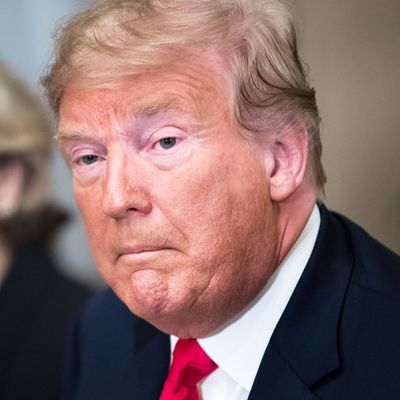
Donald Trump entered the NATO summit in Brussels this week, with plans to berate America’s European allies for their “delinquency,” and then run off to Finland for a one-on-one meeting with Vladimir Putin — which the president predicted would be “the easiest” of all the meetings on his overseas trip.
Given how well this course of action dovetails with the Kremlin’s foreign policy goals (weakening NATO being chief among those), the president’s game plan came with the risk of buttressing the perception that his 2016 campaign had illicit ties to the Russian government.
And so, Trump decided to nip that liability in the bud as soon as he got to Brussels — by deploying his time-tested, “I know you’re a Russian puppet, but what am I?” strategy.
“Germany is a captive of Russia,” the U.S. president declared in a breakfast meeting with NATO Secretary General Jens Stoltenberg, his first diplomatic encounter in the Belgian capital. “They’re getting so much of their oil and gas from Russia … It certainly doesn’t seem to make sense that they paid billions of dollars to Russia and now we have to defend them against Russia.”
Stoltenberg tried to push back on this assessment, saying, “the strength of NATO is that despite these differences, we have always been able to unite around our core task to protect and defend each other,” and “when we stand together, also in dealing with Russia, we are stronger.”
“No, you’re just making Russia richer,” Trump retorted. “You’re not dealing with Russia, you’re just making Russia richer.”
White House chief of staff John Kelly appeared less than comfortable during this tirade.
In other remarks at the breakfast, the president broadened his target to encompass all of America’s NATO allies, saying, “Many countries are not paying what they should, and, frankly, many countries owe us a tremendous amount of money from many years back. They’re delinquent, as far as I’m concerned, because the United States has had to pay for them.”
In his attack on Germany, Trump was gesturing at a genuine controversy. In March, Angela Merkel’s government cleared the way for Russian energy giant Gazprom to build the Nord Stream 2 gas pipeline through its waters. America’s Eastern European allies object to the pipeline, both because it runs through Ukraine — a risky arrangement given tensions in that region — and because it provides no energy benefit to Eastern Europe, instead delivering Russian gas straight to Germany.
Germany does import the vast majority of its natural gas resources, though it is not wholly dependent on Russian fuel. As of 2015, 35 percent of its imported gas came from Russia, 34 percent from Norway, and 29 percent from the Netherlands, according to CNN. But even as Russia does provide a significant share of Germany’s gas, Moscow’s exports still account for only 9 percent of Germany’s overall energy consumption, according to Merkel’s government.
Trump’s diatribe on our NATO allies’ “delinquency” is considerably more baseless. It is true that NATO has implored its member nations to spend at least 2 percent of their gross domestic product on military expenditures, and that most of them have not yet done so. But none are “delinquent” on that front — because the 2 percent figure is not a current requirement, but merely a target that countries are supposed to reach by 2024. Nonetheless, in closed-door meetings the president demanded that all NATO members spend 4 percent of their GDPs on defense (the United State currently spends just 3.57 percent of ours on defense), the New York Times reports. The Europeans did not accede to this request.
Trump’s indignation that the U.S. spends a higher percentage of its GDP on defense than European countries is difficult to understand. After all, the president made drastically increasing the Pentagon’s budget one of his top domestic priorities. Despite the fact that America was already spending more on its military when Trump took office than China, Russia, Saudi Arabia, France, the United Kingdom, India, and Germany — combined — the president nevertheless insisted that America’s defense budget was dangerously low.
But if Trump doesn’t want the United States to magnanimously guarantee Europe’s security — and, thereby, secure diplomatic goodwill and influence — why does he want to spend upwards of $700 billion on the military each year? Why have a global policeman’s budget if you don’t want to be global policeman? Is he under the impression that America needs a state-of-the-art, globe-spanning military to protect itself from the MS-13 street gang?
Regardless, for all his hemming, hawing, and Twitter tantrums, Trump agreed to sign a joint declaration that emphasized the enduring strength of the NATO alliance, and fiercely reprimanded Russia for its annexation of Crimea. This small gesture of solidarity is more than the Western alliance received at the G7 summit in June.
And it just might have been enough to allow the Europeans to take Trump’s tirades in stride. Asked by The Wall Street Journal about his tumultuous meeting Wednesday morning, NATO general secretary Stoltenberg replied, “We had excellent orange juice and toast. We had a good breakfast. Paid by the U.S.”






























